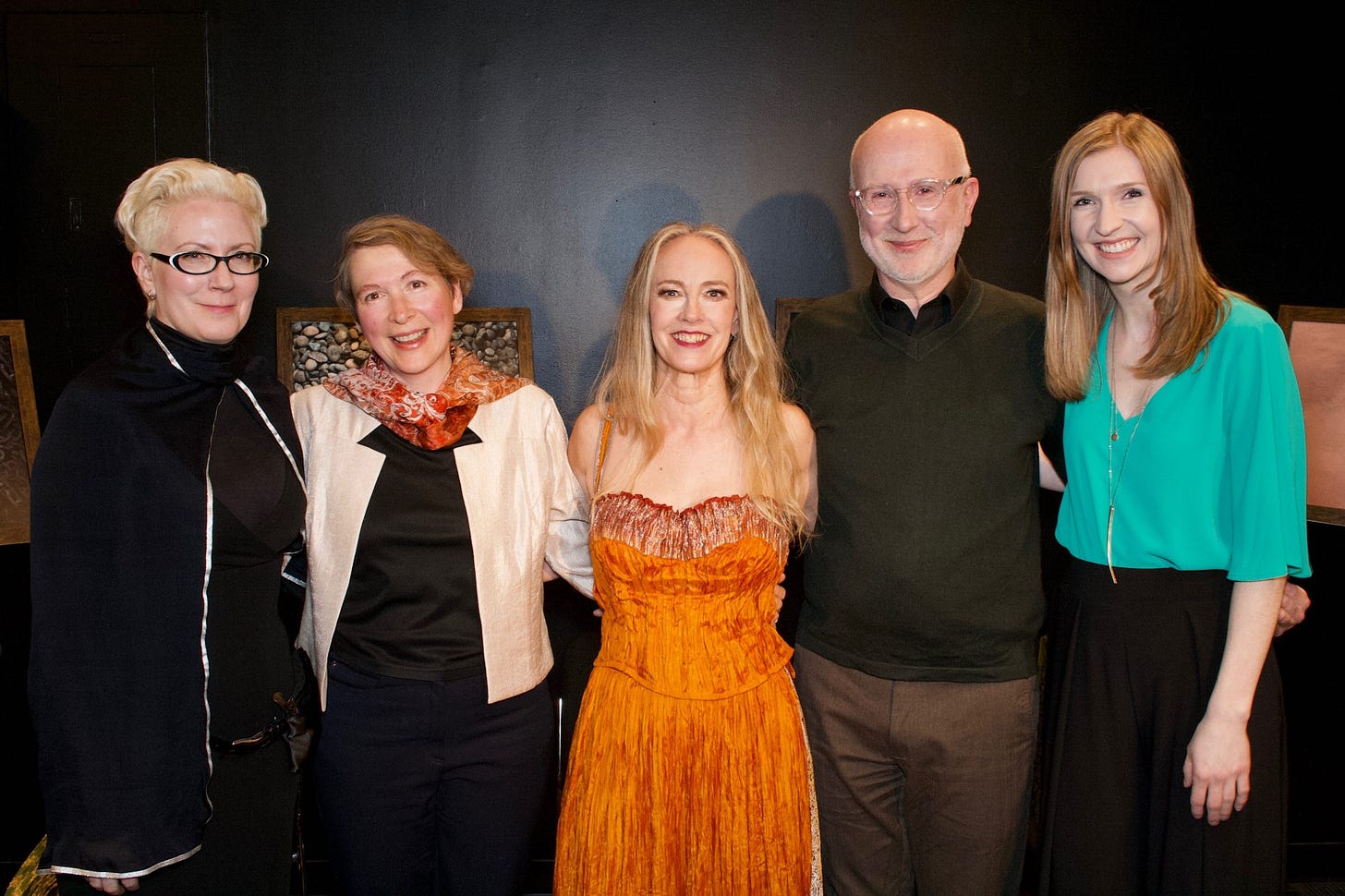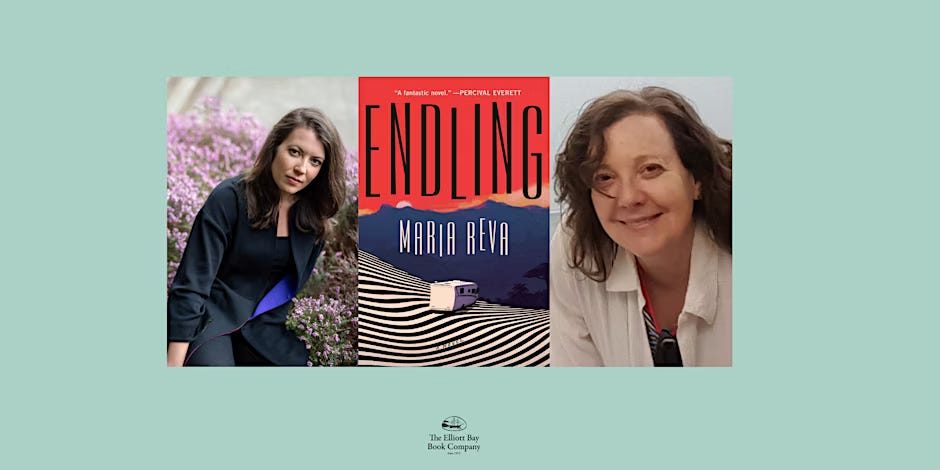If you are a paid supporter of Desperate Writer, please know that we are incredibly grateful! Your support is a little vote of confidence in our writing, and it is immensely cheering to receive. It means we are able to start two new columns next month: Pen and Paint, written by those who practice both visual and literary arts, and For the Record: Great Essays for Desperate Times. We also have a new columnist, award-winning Brazilian writer Antônio Xerxenesky, joining Desperate Writer in June for a monthly column of his own. We have some exceptional artists and writers lined up as guest columnists as well, so stay tuned and enjoy!
Paying subscribers, please take this short poll so we can know what you'd enjoy here at Desperate Writer. If you have other ideas, please reach out to me directly at rachelrosewritesprose@substack.com Thank you so much!
To our free subscribers, thank you so much for being here. We appreciate each one of you, and we've got a poll coming for you soon as well.
Without further ado, this week’s column:
~ ~ ~
Dear Desperados,
Are you still writing away, still dreaming of literary success? I feel you, you bonkers creative beings, and I feel for you, too. Because the odds are ridiculous. Everyone wants to know why: why is it so hard? If you're a young white dude writing literary fiction, they say you should give up or go genre, which I find profoundly depressing. Maybe I’m naive but I see no reason that opening to historically under-represented voices should lead to freezing out those who have historically been over-represented. I thought the whole idea was to make more room at the table for genuinely great writing, no matter who the author was. Specific contest results don’t prove bias, but the pattern is concerning. Literature is for everyone. (Caveats: genre fiction is great, literary fiction is often over-rated; the distinction between the two hardly makes sense and great books can be found in any genre. Also: if women buy the majority of fiction books, their taste will be over-represented. So men: get your book clubs on!)
Whoever you are, if you feel the cards are stacked against you to publish, you’re probably right. But even if you check all the boxes of the moment, it remains ridiculously hard to get published and get your book into the hands of readers. This path we’re on is open to all and easy for almost none.
And yet, you are here! You are full of stories you want to share with the world, big ideas you want to write about. You live by E.M. Forster's epigraph in Howard's End: Only connect! But how can you connect if you can't get an agent, a publisher, a book deal? You are a dazzling, fully functional chandelier stuck under a bridge. Who else sees you shine? Only a few lost tourists and random passers-by. How can you not be a little bit discouraged?
Chandelier under Granville Bridge, Vancouver
Friends, I hear you. I wish the publishing world were different. I wish that more people were reading serious fiction, and that publishers were willing to support unknowns of all backgrounds who just happen to be great writers, nurturing them through their long careers, believing in them through three or four mediocre books until they learn their craft and hit their stride. (I also wish that our chandelier art installation had cost far less and many more artists had had some of this glorious bounty shared among them, but anyway...)
The fact is, more of us want to be excellent writers than want to be excellent readers. It's not sustainable. And most writers are going to be shining their lights under bridges to a few people who happen to find them by chance. That's just reality.
So here you are, dear Desperate Writers, sparkling in all your glory, hoping that somehow, someone will remove the giant concrete bridge that is obscuring you with its perpetual shadow. It probably won't happen. It might. I hope for many of you it will, but statistically it probably won't. In the meantime, what can you do?
I've said before that you should be reading ten times as much as you are writing, because that creates the kind of healthy, resilient literary culture we want. You should try to find books that aren't on the bestseller lists but are of interest to you, and support those authors. Advocate for them. Buy their books. Show up.
You can keep writing, keep twinkling, keep shimmering and flashing and dazzling. Keep reading and taking classes and learning. And if you happen to be a chandelier under a bridge, maybe it's time to look around at where you are and what you can do independently. Invite your friends, build your community, share your work in whatever format you can, and shine on.
~ ~ ~
Some years ago, I had the great good fortune to work with composer Jeffrey Ryan, who created original music for my poems about monstrous and mythic women for UNHEARD.
(I’m in the cream-colored jacket)
Soprano Heather Pawsey did an extraordinary job of bringing to life such women as Grendel's mother, the wife of Siddhartha Gautama (Buddha) and the nymph Daphne, turned into a tree as she was fleeing the god Apollo. All of these mythic women who were victims of history, unheard, silenced—we let them sing! It was such a joy to work with him, Heather and the whole team, to collaborate on making something together that none of us could create alone.
My point? There are ways to connect that don't involve trying to find an agent, and then a publisher. You can find your people, and make your voice heard independently. As Leonard Cohen said about being a poet, "I have chosen a path that is infinitely wide and without direction."
Most of us will remain fundamentally unheard. I salute the human hunger to tell a story or share a life's wisdom and have it well-received. I don't think the creative impulse resides exclusively in creatives, either; I think resides in humans, and it expresses itself in whatever work we do in a state of flow, from painting to physics, poetry to medicine, teaching to parenting.
We want so desperately to connect, only to connect. We want to leave our mark, to make change, touch souls, engage in the important conversations of our time and our culture, repair what is damaged and expose what is rotten in our culture.
To write a bestseller would be extraordinary (so I hear!) But to shine like a chandelier under a bridge also matters. You never know who will receive your light in this broken world. You never know who will be passing by in need of just the warmth and brightness you offer.
One of the things I like most about Substack is finding those unexpected candelabras in the darkness, amazing creative people I'd never heard of who are thinking, writing and sharing remarkable work. None of us has the power to change the book publishing world or the way readers buy books, not even your Art Auntie. But Substack has made it possible for many writers to reach readers directly, by writing remarkable pieces that requires thoughtful reading and deep engagement. It is the only hopeful place I know of on the internet right now.
The work of making light is our only work. The rest is out of our hands. Remember this as you make your way on this directionless path that it is, as Leonard Cohen says, infinitely wide. There is room for all of us.
~ ~ ~
If you are in Seattle on June 10 at 7 p.m. get yourself to Elliott Bay Books to hear my friend Maria Reva read from Endling, her new novel, coming out June 3. https://www.eventbrite.com/e/maria-reva-w-stacey-levine-endling-tickets-1355335939279?utm_experiment=test_share_listing&aff=ebdsshios







On behalf of one bonkers creative person to another - and all creative specimens (yes, yes, even those white dude literary writers who have been historically over represented) thank you for this essay. Gonna think of myself as that under loved chandelier henceforth!
“I thought the whole idea was to make more room at the table for genuinely great writing, no matter who the author was.” Sounds nice but methinks you are perhaps naive. The arts, maybe especially literary publishing, has been captured by an ‘intersectionality’ mindset, which sees white males as not just historically privileged, but as oppressors. ‘Social’ justice demands that we not allow oppressors a voice, only the marginalized aka the oppressed. Which actually means only group identity matters, not individual, and that is the death of art, among other things. To be clear, I appreciate your apparent naïveté because therein lies a glimmer of hope. Thank you for your perspective.